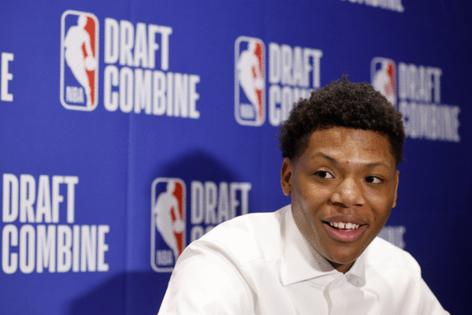Mike Sielski: There are reasons the Sixers shouldn't draft Ace Bailey. Canceling a workout isn't one of them.
Published in Basketball
PHILADELPHIA — How dare he. How dare he. Who does this kid think he is? Refusing to work out for certain teams? Trying to dictate terms to an entire league? Doesn’t he understand his place in the pecking order? He’s not even 19 yet, and he and his agent somehow believe that he has some power here, some leverage, some standing to say, I don’t want to go here, but I will go there. What delusions of grandeur. What an entitled little jerk.
Kobe Bryant heard all those insults and more during the run-up to and in the aftermath of the 1996 NBA draft — so much vitriol and indignation directed at a teenage phenom who understood and trusted his talent more than most people in pro basketball did then. He and his agent at the time, Arn Tellem, pulled off one of the greatest head fakes ever seen in sports, cooling one club after another on Bryant by simply saying, No, Kobe won’t work out for you. The kid allowed himself to be painted as a punk, and it turned off enough teams that he fell to the No. 13 pick, where the Charlotte Hornets picked him … then promptly traded him to the Los Angeles Lakers, where Bryant wanted to be all along.
None of that brief history lesson should be taken to mean that Rutgers star Ace Bailey is bound to be the next Bryant — to be a Hall of Famer, a five-time NBA champion, and maybe the most competitive SOB ever to lace up a pair of high-tops. None of it even means that the 76ers should select Bailey with the third pick in next week’s draft. Yes, back in ’96, Bryant told several teams that they shouldn’t bother scheduling time with him. Yes, Bailey canceled a pre-draft meeting/workout with the Sixers that was supposed to take place Friday. The similarities between them are likely to end there.
Picking Bailey would be a home-run-style swing, a gamble that he will develop into a superstar and help his team win games at a rate that Rutgers did not in his only collegiate season. But there are enough questions about the player he is now and the player he might yet be that it would be prudent for the Sixers to pass on him. They can’t afford to miss at No. 3, and Bailey, given where the Sixers are picking and relative to other players in this draft, is too risky.
But that perspective and projection are separate issues from the tactics that Bailey and his representatives are using to work the system to his advantage. There’s a suspicion that Bailey wants to end up with a team where he’ll be the center of both the fanbase’s attention and the team’s offense right away, where he won’t have to share the spotlight or wait in the wings. Maybe that’s true. So what? It was true of Bryant, too, and at age 17, he was joining a Lakers team that already had Shaquille O’Neal, Eddie Jones and Nick Van Exel and was already a contender in the Western Conference. That kind of confidence can be a desirable quality in a young athlete if he or she channels it properly. The notion that the Sixers should stay away from Bailey because of this gambit, because he is being disrespectful to Philadelphia or doesn’t know his place, is about as paternalistic and condescending as it gets.
If anything, the puzzling and off-putting part of Bailey’s strategy is how antiquated it is. Bryant and Tellem, for instance, were able to exploit and manipulate the system because they were willing to flout two pieces of mid-1990s conventional wisdom: that drafting a high school player posed an inherently greater risk than drafting a college player, and that any draftee who didn’t accede to the demands and expectations of every NBA team had to be a diva or a troublemaker or both.
“It’s depressing,” Jerry Reynolds, the player-personnel director of the Sacramento Kings at the time, said after the ‘96 draft, “that any player and his representation, who have their choice of entering the draft or electing not to enter the draft, turn around and don’t follow the rules of the draft.”
Well, those days are gone forever, and most NBA teams, if not all of them, have just let them go. Ten years ago, when the Sixers picked Jahlil Okafor at No. 3, a minor controversy developed over the suggestion that they passed on Kristaps Porziņģis because Porziņģis hadn’t worked out for them … which made sense until someone pointed out that Okafor hadn’t worked out for them, either.
Rutgers is a 70-mile drive from the Sixers’ headquarters in Camden. Daryl Morey and his scouts have collected plenty of reconnaissance on Bailey, and aside from the annoyance of Sixers staffers having to cancel hotel and restaurant reservations for Bailey’s now-aborted visit, aside from the convenient outrage of those who get their jollies and earn their paychecks by being outraged, there isn’t much to what happened here. If the Sixers think Ace Bailey can play, they’ll pick him. Nothing else matters. Nothing else should matter. Nothing else will.
___
©2025 The Philadelphia Inquirer. Visit inquirer.com. Distributed by Tribune Content Agency, LLC.







Comments